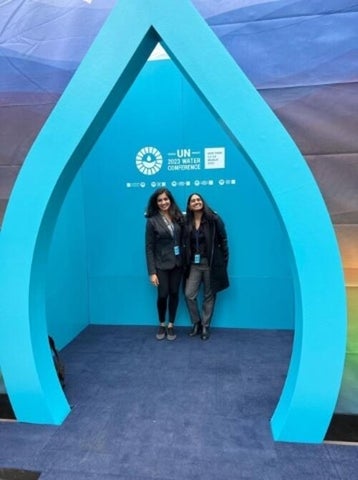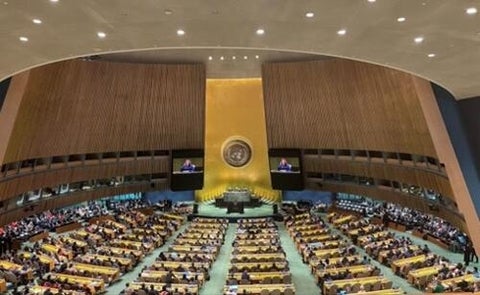Originally posted by the Water Institute. Read full story here.
From March 22–24, the United Nations hosted the 2023 Water Conference at UN Headquarters in New York City, the first UN Water Conference in nearly 50 years. Thousands of participants travelled from across the globe to discuss progress and make new commitments towards achieving Sustainable Development Goal (SDG) 6 – Ensure access to water and sanitation for all. Having received special accreditation from the UN General Assembly, the Water Institute supported the participation of four University of Waterloo Ph.D. students to participate in the conference. The following are their reflections on key outcomes of the conference:

University of Waterloo Ph.D. students Navya .V. Nair, Kevin B. White, Isabel Jorgensen, and Harshina Brijlall attend the UN Water Conference at UN Headquarters in New York, March 22–24.
Gendered dimensions on water: The current status of SDG 6.2 to achieve adequate and equitable sanitation and hygiene for all
Harshina Brijlall | Department of Biology
Witnessing women in leadership positions speak at this historic UN conference was inspiring. As a biology student from the Faculty of Science, I was interested in attending dialogues on biodiversity and source water protection (SWP) topics. Although I had the opportunity to participate in panels, plenaries and events discussing biodiversity and SWP, I found myself inspired by the many women leading programs and organizations addressing the relationship between SDG 6 (clean water and sanitation) and SDG 5 (gender equality) during the following events:
"Empowering Communities through Access to Clean Water and Sanitation: Solutions for Health, Gender Equality, and Climate Resilience," "Cross-sectoral partnerships to accelerate progress towards inclusive sanitation," "Accelerating Women's Inclusion in Water," "Accelerating Women's Inclusion in Water," "Achieving SDG 6 through (1) a gender lens on climate change & youth and (2) global goals for menstrual health & hygiene."
Sustainable Development Goal 6.2 aims to ensure safe water, adequate and equitable sanitation and hygiene for women, girls and those in vulnerable situations by 2030. Women and girls in many areas globally lack privacy when relieving themselves and rely on open defecation, which endangers them.
"Women and girls suffer in silence. Girls don't have freedom over their bodies. Children are raising children." -Nice Nailantei Lengete, Global Ambassador to End Violence Against Women and Girls in Kenya
The Global Analysis and Assessment of Sanitation and Drinking Water (GLAAS) reported that women and girls play a prominent role in water carriage and usage globally. The lack of menstrual hygiene products combined with societal menstruation taboos results in many young menstruators missing school and work.
During the Commission on the Status of Women on March 6, 2023, UN Secretary-General Antonio Guterres stressed, "Gender equality is growing more distant. On the current track, the United Nations Entity for Gender Equality and the Empowerment of Women puts it [gender equality] 300 years away."
So how can we ensure universal access to safe water, sanitation, and hygiene (WASH) by 2030 if gender equality is 300 years away?
Tracking and reporting the gendered dimensions of water, empowering women in water leadership and policymaking roles, forming multi-stakeholder platforms to exchange ideas and promoting investments in gender equality in the water sector were all highlighted as actionable items during many panels that I attended.
Witnessing women in leadership positions speak at this historic UN conference was inspiring. Although the conversations around the relationship of WASH with women, girls, and vulnerable groups were difficult and filled with grief, anger and frustration at the current progress of SDG 6.2, an underlying current of hope was present.
The interactive dialogues, events, and plenaries all included and highlighted how water is a health catalyzer and the importance of anchoring diversity and ensuring access to WASH for all. In the conference's closing ceremony, over 648 commitments were announced for the Water Action Agenda, which is promising for the progress of SDG 6.2.

Day 1 of the UN Conference.

Closing ceremonies in the Great Hall.